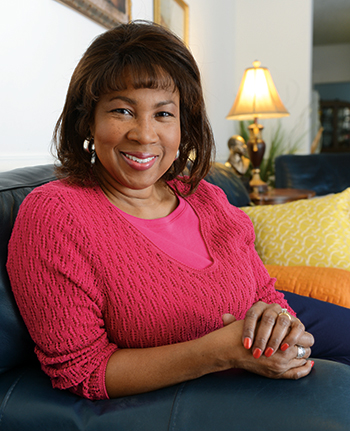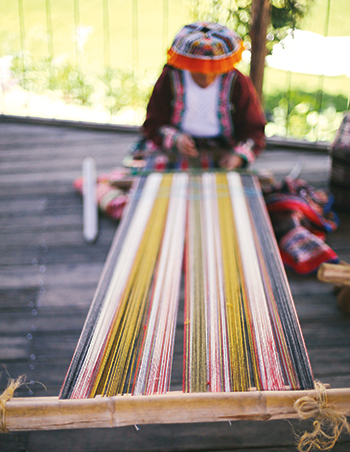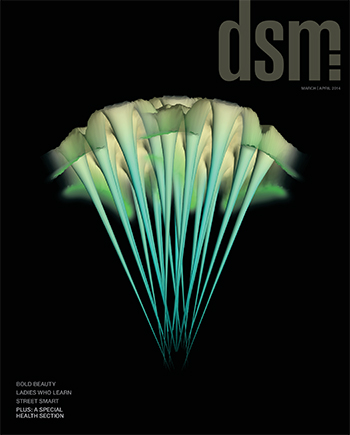 The Pull of Poetry
The Pull of Poetry
All her life, Amelia Hamilton-Morris has been a communicator. She recognized that about herself even as a child growing up in Houston, Texas, later making her mark in high-profile public relations, broadcasting and marketing positions.
She won awards as a television producer-reporter, working in Houston, Washington, D.C., and Des Moines. Currently, she’s chief communications officer for the city of Des Moines.
And she’s a newly published poet—although not a new poet.
Hamilton-Morris wrote poetry as a student at Spelman College in Atlanta and American University in Washington, D.C. And she wrote poetry when she was a reporter.
“After a news day with all the tension and stress, it was a way of pulling emotion out,” she says. “When I could define it on paper, it no longer burdened my heart.”
Hamilton-Morris moved to Des Moines when she met and married Iowa native William Morris. She continued her career while raising two sons, but a health scare in 2012 prompted her to finally publish her first book of poetry, titled “Timeless Truth.”
“The book was something that I’ve always wanted to do,” she says. “It was on my bucket list. And to tell you the
truth, after I did it, I was scared to death. I thought, ‘What the hell was I thinking?’ ”
Her validation has come in the reaction of readers and of audiences when she reads her poetry aloud. She revels in the fact that they can relate to what she’s written.
“Performing my work gives me an exhilarating joy, like nothing else,” she says. “It’s better than a good live shot (as a TV reporter)—when you’re flying by the seat of your pants and something goes wrong but you’re still able to recover and nobody knows anything went wrong but you and the photographer on the scene. And you look back at it, and it seems perfect and you go, ‘That’s some kind of good!’ ”
Carol Levine of West Des Moines happened upon one of Hamilton-Morris’ bookstore readings recently and was immediately captivated. “Before I knew it, I was seated, holding her book and following along as she read,” she says. “Amelia gave her poetry reading to me—one person—like I was a crowd on Broadway.”
Hamilton-Morris’ words should be savored, not devoured, Levine adds. “There is a lifetime in her pages, with memories behind each line,” she says. “I think some memories are joyful, and some are lessons learned or accepted after an event or relationship.”
Hamilton-Morris says her poetry is intentionally straightforward so everyone who reads it can relate. Her poems are based on real-life experiences, she says, “mine or somebody else’s.”
And her poetry is anchored in her faith: “It is my moral compass that defines my sense of right and wrong.”
People who know her well are not surprised that Hamilton-Morris published a book of poetry, says business consultant Diana Deibler, president of Deibler & Co., who has been a friend for nearly 25 years.
“Poets are masterful at observation—like a detective or, in Amelia’s case, an excellent journalist,” Deibler says. “Poets also take risks, and she is both fearless and generous. Can you imagine what it takes to delve into one’s memories and values and then share the private, the intimate and that which you hold dear?”
Hamilton-Morris is already eager to work on her next book. “I want to take this gift that God has given me, that I’ve had all my life and had tucked away,” she says. “I love writing poetry. It’s a very big part of who I am and what I was created to do.”
Written by Jane Schorer Meisner
Photo by Duane Tinkey
 Fair Trade Fashion
Fair Trade Fashion
When Emily Fifield and Lexi Wornson met for coffee in 2010, lesson planning for a community Spanish class was on the agenda. But kismet would soon arrange a different future for the two, who would within months establish Chiri, an international fair-trade clothing business.
The company stemmed from Fifield and Wornson’s individual passions. Intrepid and adventurous, Fifield had been reeled in by Peru while on an Iowa State University summer study abroad program. She became intrigued by the Ñañas, a group of about 30 women in an income-generating knitting circle outside Arequipa who spoke Quechua and Aymara. “Somehow I got it into my head that I was going to come back and continue building on relationships and maybe get the group fair trade certified,” Fifield says.
So she did what any enthusiastic 20-something would do: She called her parents from Peru, told them she was taking a semester off to work with the women, switched her major to Spanish, and stretched out graduation by a year. By the end of her extended sojourn in South America in 2007, Fifield was as much a part of the community as any outsider could be, and she had begun to sell some of their alpaca knitted items in several fair-trade stores.
For her part, Wornson—whose family owns Back Country Outfitters, where she works—had a burgeoning interest in “slow” goods: those that are not mass market but instead come with a story and create a connection. When Fifield mentioned that the Peruvian knitwear needed updating, it was serendipitous: Wornson, now 33, had studied design; was a sewer, knitter and pattern maker; and had always been interested in creating clothing. And thus Chiri, a Quechua word loosely translated as “cold out,” was born. “Within a few weeks, we were making plans to form a business and to start on our first collection in January of 2011, and we were off,” the 28-year-old Fifield says.
The pair admit they had no idea what they were getting into or how much work it would take. But in just three years, they’ve built up a market, with goods in 10 Midwestern stores. They don’t carry inventory but instead generate wholesale orders from samples. Responsibilities naturally divide themselves by hemisphere: Wornson handles North America, building and maintaining relationships with stores, while Fifield works out the details in South America, helping organize and manage the collective.

Emily Fifield

The two partners are committed to increasing the self-sufficiency, business skills and income stability of the Peruvian women, who typically have no formal education. “It’s a slow process to move beyond that reactive mentality when the women have lived for so long with so little control over their lives, but it’s critical for the growth and success of the group,” says Fifield.
But success in the United States is top of mind, too. Chiri is not a one-way business, but one that Wornson sees meeting a specific, underserved niche here as well. “We are telling a story, and it’s important that consumers buy into the story when they buy the product,” she says. “Artisan craft doesn’t have to look like the thing you think it looks like. It comes in lots of different forms.”
“But if the clothes aren’t beautiful, people won’t buy them,” Wornson adds. “Women are so hard on themselves, and their clothes make a difference. If you look good and have made a good choice with your purchase, it becomes your armor.”
Written by Kelly Roberson
Photos by Austin Day








